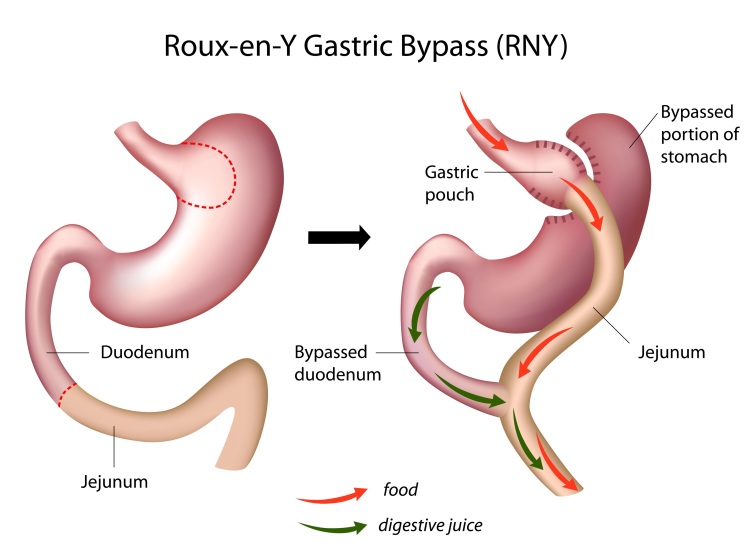
At the age of twenty I underwent the Roux-en-Y gastric bypass, known simply as gastric bypass. At 337 pounds I was my heaviest– pre-diabetic and severely depressed. Although my life was just beginning, my weight held me back. I tried programs like Weight Watchers and Jenny Craig, but nothing worked. For years I fell deeper into the endless pit of obesity. My doctor suggested weight loss surgery, which was one method I hadn’t tried.
There are three kinds:
- Roux-en-Y gastric bypass
- The Lap Band
- Sleeve Gastrectomy
Each option has benefits, but I chose gastric bypass. The procedure was created by Dr. Edward Mason “as an outgrowth of his work with the surgical treatment of ulcers and stomach cancers.” After much practice and research, the surgery became the gold standard it is today. The process has two primary components:
- A small pouch is created by dividing the stomach into two parts. This creates a one-ounce pouch, also known as your new stomach.
- The small intestine is then divided and the bottom of that piece is connected to your newly created stomach pouch. The surgery is then completed after the opposite end of the small intestine is connected downward along the small intestine.

Compared to others, gastric bypass surgery has less complications and yields a large weight loss percentage. Patients are expected to lose between 60 to 70 percent of their excess weight, that’s about an average 100-pounds. To achieve this goal, the patient’s calorie intake is dramatically decreased to aid in weight loss.
Despite losing weight, many patients are also resolved of prior diseases. The situations vary, but here are some examples of diseases improved or fixed by gastric bypass:
- High blood pressure
- Sleep apnea
- Asthma
- Arthritis
- Cholesterol
- Gastroesophageal reflux disease
- Fatty liver disease
- Venous stasis
- Urinary stress incontinence
- Pseudotumor Cerebri
There are also lifestyle benefits. The difference in attitude and physical adeptness is phenomenal for individuals who lose a lot of weight and changes in mobility, self-esteem, and social interaction are often reported. Those who felt depressed or anxious about their self-image have shown to feel confident and enthusiastic toward their new body. Even more, the American Society for Metabolic and Bariatric Surgery found that unemployment, singlehood, and disability also dramatically decrease.
But, there are risks. Like any dramatic procedure, complications happen. Generally, patients with diabetes, high cholesterol, sleep apnea, or any of the above diseases have a higher risk of complications. Surgical risks according to the Mayo Clinic include:
- Excessive bleeding
- Infection
- Adverse reactions to anesthesia
- Blood clots
- Lung or breathing problems
- Leaks in your gastrointestinal system
- Death (rare)
Overall, gastric bypass is a tool and not a solution. Weight loss will always be a struggle, but surgeries like gastric bypass encourage patients to start and maintain a healthy life. For me, gastric bypass was my savor. I’ve lost over 120 pounds and my journey has just begun.
If you’re thinking about gastric bypass, are already part of the bariatric community, or have a family member who’s undergone the surgery join me in spreading knowledge and support for gastric bypass patients. Together we can be healthy.
Feature image of heart stethoscope via Pixabay